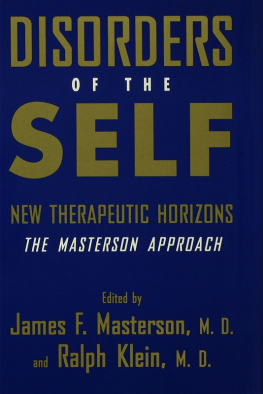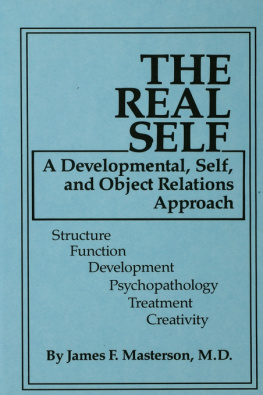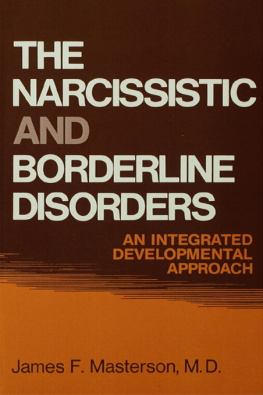DISORDERS OF THE SELF
New Therapeutic Horizons
The Masterson Approach
OTHER WORKS BY JAMES F. MASTERSON, M.D.
THE EMERGING SELF
A Developmental, Self, and Object Relations Approach to the Treatment of the Closet Narcissistic Disorder of the Self
COMPARING PSYCHOANALYTIC PSYCHOTHERAPIES Developmental, Self, and Object Relations Self Psychology Short-Term Dynamic
(with Marian Tolpin, M.D. and Peter E. Sifneos, M.D.)
PSYCHOTHERAPY OF THE DISORDERS OF THE SELF
(with Ralph Klein, M.D.)
THE REAL SELF
A Developmental, Self, and Object Relations Approach
TREATMENT OF THE BORDERLINE ADOLESCENT
A Developmental Approach
THE PSYCHIATRIC DILEMMA OF ADOLESCENCE
COUNTERTRANSFERENCE AND PSYCHOTHERAPEUTIC TECHNIQUE
Teaching Seminars on Psychotherapy of the Borderline Adult
THE NARCISSISTIC AND BORDERLINE DISORDER
An Integrated Developmental Approach
FROM BORDERLINE ADOLESCENT TO FUNCTIONING ADULT
The Test of Time
PSYCHOTHERAPY OF THE BORDERLINE ADULT
A Developmental Approach
DISORDERS OF THE SELF
New Therapeutic Horizons
The Masterson Approach
Edited by
James F. Masterson, M.D.
and
Ralph Klein, M.D.

Library of Congress Cataloging-in-Publication Data
Disorders of the self : new therapeutic horizons : the Masterson approach / edited by James F. Masterson and Ralph Klein.
p. cm.
Includes bibliographical references and index.
ISBN 0-87630-786-1 (hardcover)
1. Personality disordersTreatment. 2. Object relations (Psychoanalysis) 3. Self psychology. I. Masterson, James F. II. Klein, Ralph.
RC554.D57 1995 | 95-20920 |
616.858dc20 | CIP |
Copyright 1995 by Brunner/Mazel, Inc.
All rights reserved. No part of this book may be reproduced by any process whatsoever without the written permission of the copyright owner.
To order, call 1-800-821-8312, or write to:
Taylor & Francis
47 Runway Road, Suite G
Levittown, PA 19057-4700
Manufactured in the United States of America
Contributors
KARLA R. CLARK, Ph.D., received her M.A. from the University of Chicago School of Social Service Administration and her Ph.D. in clinical social work from the California Institute for Clinical Social Work. A Board Certified Diplomate in Clinical Social Work, Dr. Clark served on the faculty of the Masterson Institute (San Francisco) for eight years.
RICHARD E. FISCHER, Ph.D., received his degree in clinical psychology from S.U.N.Y., Buffalo. He was a Post-Doctoral Fellow at the New York HospitalCornell Medical Center (Westchester Division) and Psychology Fellow at the Langley Porter Institute, University of California at San Francisco, School of Medicine. Dr. Fischer is a faculty member and supervisor in the Masterson Institute (New York).
DAVID GRUBB, M.D., is a board certified psychiatrist who received his training in psychiatry at the San Francisco General Hospital. He is a member of the clinical faculty in psychiatry at the University of Washington School of Medicine. Dr. Grubb is a graduate of the Masterson Institute (Spokane).
SHIRLEY ZUCKERMAN ISSEL, M.S.W., received her Masters degree in social work from Smith College. She is a graduate of the Masterson Institute (San Francisco).
RALPH KLEIN, M.D., is Clinical Director of the Masterson Institute. He received his training in both pediatrics and psychiatry at New York Hospital-Cornell. He is Assistant Clinical Professor of Psychiatry, Columbia College of Physicians and Surgeons, and is co-editor of Psychotherapy of the Disorders of the Self: The Masterson Approach and of this volume.
CANDACE ORCUTT, M.S.S.W., Ph.D., is a Board Certified Diplomate in Clinical Social Work who received her degrees from Columbia University and International University. Dr. Orcutt is a certified psychoanalyst who trained at the New Jersey Institute. She is also a certified clinical hypnotist and member of the American Society of Clinical Hypnosis. Dr. Orcutt is a faculty member and supervisor in the Masterson Institute (New York).
JUDITH PEAHSON, Ph.D., received her degree in psychology from Fordham University. She is supervising psychologist, Bronx Psychiatric Center, and Clinical Instructor, Albert Einstein College of Medicine. A graduate of the Masterson Institute, she is a faculty member and supervisor in the Masterson Institute (New York).
BILL ROBBINS, Ph.D., received his degree in clinical psychology from the Professional School of Psychology, San Francisco. Dr. Bobbins is a graduate of the Masterson Institute (San Francisco).
KEN SEIDER, Ph.D., received his degree in clinical psychology from the California Graduate School. Dr. Seider, a graduate of the Masterson Institute, is certified in psychoanalytic psychotherapy from the Mount Zion Hospital. He is a faculty member and supervisor in the Masterson Institute (San Francisco).
STEPHEN SILBERSTEIN, M.D., is Associate Clinical Professor of Psychiatry, University of California at Davis, School of Medicine. He is staff psychiatrist at the California Department of Corrections Medical Facility at Vacaville and is a graduate of the Masterson Institute (San Francisco).
BARBARA L. SHORT, Ph.D., received her degree in community psychology at the University of California, San Francisco. Dr. Short is a Fellow and Diplomate of the American Board of Medical Psychologists. She is a graduate of the Masterson Institute (San Francisco).
Preface
The Masterson Approach to the study and treatment of the disorders of the self (formerly the personality disorders) has been carried forward in the past decade by myself and by the continuing efforts of a second generation of clinicians with whom I have workedfirst as my students, and subsequently as my colleagues. The initial fruit of that collaboration was presented in Psychotherapy of the Disorders of the Self (1989).
My own work has turned in the past number of years to a sharper focus on the self and the elucidation of the closet narcissistic disorder of the self (The Emerging Self, 1993).
To retain its vitality and to have continued life, any theory must be so integrated by those who learn it that they are able to use it to explore and extend its horizons. In Psychotherapy of the Disorders of the Self, my colleagues demonstrated their mastery of the theory and its clinical application. In the present volume, they now explore and extend the horizons of the theory.
First, the clinical importance of the schizoid disorder of the self was only hinted at in my previous work. The development of the understanding and treatment of the disorder in a developmental, self, and object relations perspective has now advanced rapidly through the efforts of Ralph Klein, Clinical Director of the Masterson Institute. With the publication of this volume, the schizoid disorder of the self takes its place alongside the narcissistic and borderline disorders of the self as a third major dimension of psychopathology.
Second, the vast amount of attention that has been paid to the impact of early physical and sexual abuse on the developing self and the disorders of the self has forced clinicians to refocus once more the dual therapeutic lenses of diagnosis and treatment. How does early physical and sexual trauma affect the development of the self, our view of psychopathology, and our efforts to match therapeutic interventions to this new knowledge? These subjects are introduced and dealt with for the first time in the Masterson Approach by the work of Candace Orcutt, Faculty Member of the Masterson Institute.
Next page







